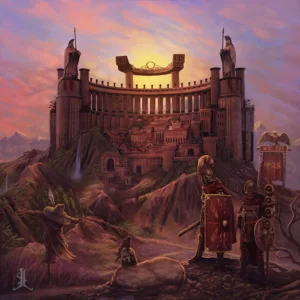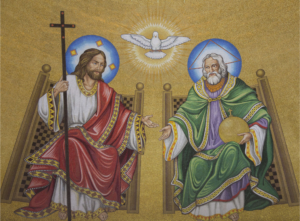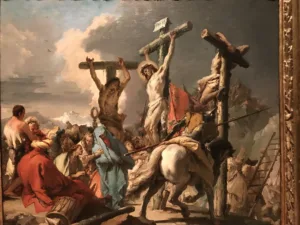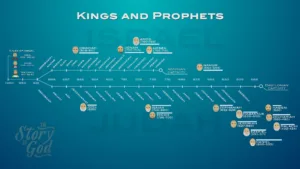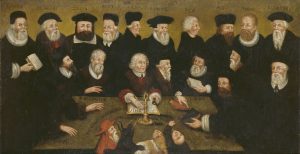What is Eschatology?
Eschatology is the study of the end times. The Merriam-Webster Dictionary defines it this way:
1: a branch of theology concerned with the final events in the history of the world or of humankind
2: a belief concerning death, the end of the world, or the ultimate destiny of humankind
specifically: any of various Christian doctrines concerning the Second Coming, the resurrection of the dead, or the Last Judgment
When Are the End Times?
Some would relegate “the end times” only to events yet to happen in the future, even the immediate future. But, a growing body of scholars and believers who believe otherwise. They agree the end times encompass the period from Calvary to the Second Advent of Christ. I say the end times began at the baptism of Jesus by John the Baptist and will extend to the Second Advent of Christ. Whether I am right is moot. I agree that Calvary and the Resurrection clarified the end times. Let us consider the words of Peter:
But do not overlook this one fact, beloved, that with the Lord one day is as a thousand years, and a thousand years as one day. The Lord is not slow to fulfill his promise as some count slowness, but is patient toward you, not wishing that any should perish, but that all should reach repentance. But the day of the Lord will come like a thief, and then the heavens will pass away with a roar, and the heavenly bodies will be burned up and dissolved, and the earth and the works that are done on it will be exposed. (2 Pet 3:8)
The Scope of this Article
I won’t develop a complete analysis of eschatology in this article. I want to cover one dynamic aspect of eschatology that is often skimmed over. That aspect is the fact that there is a quality of certain eschatological events that is both “already” inaugurated and “not yet” completed. In other words, some things have begun. In the mind of God are settled. But they will not see their full manifestation until the Second Advent of Christ, “on that day.”
Let’s consider the following passage Jesus uttered on his second trip up to Jerusalem. It follows the healing of the man who had been healed after 38 years of being an invalid, on the Sabbath. He first establishes his authority: it comes because he is equal with the Father. The Father gives life, so he gives life. He declares, “He who does not honor the Son does not honor the Father.” He then makes a remarkable statement that we often pigeonhole to a future event.
Truly, truly, I say to you, whoever hears my word and believes him who sent me has eternal life. He does not come into judgment, but has passed from death to life.
Truly, truly, I say to you, an hour is coming, and is now here, when the dead will hear the voice of the Son of God, and those who hear will live. For as the Father has life in himself, so he has granted the Son also to have life in himself. And he has given him authority to execute judgment, because he is the Son of Man. Do not marvel at this, for an hour is coming when all who are in the tombs will hear his voice and come out, those who have done good to the resurrection of life, and those who have done evil to the resurrection of judgment. (John 5:24-29)
How is Eschatological Tension Demonstrated?
This passage speaks of the resurrection life that comes to believers at the return of Christ. But this is not only a future benefit. Resurrection life is synonymous with eternal life. It comes to believers the moment they commit to Christ. They get raised from spiritual death. Believers live in eternal/resurrection life from that moment forward.
We should pay attention to each time Jesus says the equivalent of “the hour is coming and is now here when…” This alludes to the tension between NT eschatology’s ‘already’ and ‘not yet’ aspects. When Jesus says, “an hour is coming when…”, Jesus alludes only to the ‘not yet’ aspect of NT eschatology.
The Bible is the inspired word of God (2 Tim 3:16). We should not pass by these paradoxical constructs by shrugging a non-curious shoulder. These ideas are there for our serious consideration. This is true whether Jesus makes the statement, or any other NT author makes the statement. “All scripture is breathed out by God…”
Be cognizant of and curious about these types of passages.
What Do the Experts Say?
D. A. Carson says the following about this passage:
The tension inherent in Christian eschatology between what belongs to the ‘already’ and what belongs to the ‘not yet’ is teased out in this and the following verses. For the expression a time is coming and has now come, cf. notes on 4:23. By v. 28, where the eschatology is orientated entirely toward the future, the ‘time’ or ‘hour’ is coming; John does not say it ‘now is’. Here, however, the coming hour already is: the resurrection life for the physically dead in the end time is already being manifest as life for the spiritually dead. It is the voice of the Son of God (or his word: cf. v. 24; 6:63, 68; 11:43) that calls forth the dead, and those who hear (cf. notes on v. 24) will live. Such a voice, such a life-giving word, is nothing other than the voice of God (cf. Is. 55:3), whose vivifying power mediates the life-giving Spirit (cf. 3:3, 5; 7:37–39) even to dry bones (Ezk. 37).[1]
Let’s Break Down the Example
In light of this analysis, I offer this breakout John 5:24-29.
In verse 24, Jesus makes a statement we may not completely pay attention to.
Truly, truly, I say to you, whoever hears my word and believes him who sent me has eternal life. He does not come into judgment, but has passed from death to life.
When he says he “has” eternal life, the primary sense of the word ἔχω in Greek (has) is to possess or own. When he says, “has passed from death to life”, it is past perfect tense, it is a done deal. Past perfect designates “happened in the past and is completed.” Whoever hears his word and believes has eternal life.
In verse 25, he says this.
Truly, truly, I say to you, an hour is coming and is now here, when the dead will hear the voice of the Son of God, and those who hear will live…
I want to focus on the “coming/now here” aspect of what Jesus says. That phrase is a big clue to how to interpret this passage. He is saying, “Here is a truth that will come to fruition in the future but is completely true now. When the sinner, dead in sin, hears the voice of the Son of God, those who hear will live. The Father has life. He has granted the Son to have life in himself. The Father has given the Son authority to execute judgment because he is the Son of Man.” Look at the chain of logic. This is a done deal. We have life if we are in the Son.
Now, let’s look at the nature of that eternal life. Verse 28 says.
…an hour is coming…
This is a future event relative to the conversation at hand. It is, in fact, the Second Advent. “…all who are in the tombs will hear his voice…” confirms this. The only time everyone comes out of the tombs is on the Day of the Lord, for the Great White Throne of Judgment. Verse 29 further confirms this. It describes the final act of Earth’s history, life for the good, and judgment for the evil.
Conclusion
Do you now see the connection to forming a robust NT eschatology? A transformation happens when we say yes to Christ and believe in him who sent him. We get resurrected from our dead-in-sin state into eternal life. That happens immediately. We ought to walk in the light of that truth until Christ comes back or The Father calls us home. But Christ tells us not to marvel at that. God is not finished. Our bodies get resurrected on the Last Day to a glorified state, entering into the New Heaven and New Earth.
I will not examine all the NT passages that speak of these realities. You will find them in Romans, Ephesians, Colossians, and Hebrews. Check out the epistles of John and Peter, etc. There are far too many to cite. Read them yourself and rejoice. But you can’t do that if you don’t read with faith and curiosity. Take note of verb tenses. Pay attention to relationships. Read with anticipation of getting to know the universe’s Creator and the Son he sent to redeem you. Getting to know them is the greatest reward that you can have in this world or the next.
Christ sits on his throne in the heavenly places, and we are in Christ. This is not some potential reality that we will get to someday in the indeterminate future. Jesus and the whole NT declare this is our life – right now – today. Let’s walk in it. Let me leave you with this analogy.
Stand gazing at the mature fruit tree, marveling at the beauty of the blossoms, and remember this. Those blossoms, in the not-too-distant future, will complete the transformation into fruit. You will eat that juicy fruit and delight in it. It is a done deal.
The reigning victory of Christ and the fruitfulness of the believer sound millennial, don’t they?
__________
[1] Carson, D. A. The Gospel according to John. Inter-Varsity Press; W.B. Eerdmans, 1991, p. 256.
(Your purchase of one of these resources, from this site helps support this ministry)
Is there biblical evidence for a thousand-year earthly kingdom (the Millennium) ruled by Christ before the fulfillment of the new heaven and new earth?
Revelation chapter 20 seems to suggest so, but few books of the Bible are so difficult to interpret. And a discussion of the Millennium branches out into many other theological questions about the end times (eschatology): Are these the last days? What must happen before Jesus returns? What part does the church play?
This Counterpoints volume compares three views of the Millennium:
- Premillennial: Christ will come again before this kingdom is established.
- Postmillennial: our present age represents that kingdom and that the church is and must move toward the fulfillment of this kingdom.
- Amillennial: a future Millennium is not a literal kingdom, and when Christ returns, he will usher in an immediate new heaven and new earth.
Robert B. Strimple, Kenneth L. Gentry Jr., and Craig A. Blaising offer their perspectives, giving their exegetical reasoning. Each of them then responds to the views held by their peers in a respectful and informative setting, making it easy for you to compare their beliefs and gain a better understanding of how this aspect of Christianity’s great hope–the return of Jesus–is understood by the church.



